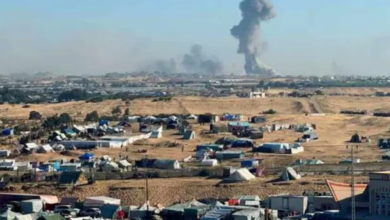Palestinian groups, Israeli forces agree to Gaza ceasefire
Israeli forces and armed Palestinian groups in Gaza have agreed to a ‘reciprocal and simultaneous’ ceasefire.
Palestinian hunger striker Khader Adnan dies in Israeli prison
Israeli forces and Palestinian armed groups in Gaza have agreed to a ceasefire after a night of Israeli air strikes that pounded the besieged coastal enclave, while rockets were launched towards Israel following the death in prison of prominent Palestinian hunger striker Khader Adnan.
The “reciprocal and simultaneous” ceasefire went into effect at 3:30am (00:30 GMT) and was brought about with efforts from Egyptian, Qatari and United Nations officials, two sources told the Reuters news agency on Wednesday.
Islamic Jihad spokesman Tareq Selmi said fighting had ended by dawn on Wednesday.
Hamas had engaged in talks with Egyptian, Qatari and UN officials to end Israeli “aggression on Gaza”, the group said in a statement earlier on Wednesday.
Hamas said its leader, Ismail Haniyeh, held talks with officials from both countries and the UN to end Israel’s attacks, which saw Israeli fighter jets and tanks attack targets in Gaza late on Tuesday, and Palestinian fighters fire rockets into Israel, following the death of Adnan after he spent 87 days on hunger strike in an Israeli jail.
A Palestinian source told Al Jazeera Arabic that the ceasefire was the result of several parties entering talks to prevent Israel’s attack on Gaza from escalating. Hamas also praised the performance of the Palestinian armed groups that had jointly responded to Adnan’s death, Al Jazeera Arabic reported.
A joint statement by factions in Gaza on Tuesday, including Hamas and Islamic Jihad, said the rocket fire was an “initial response” to Adnan’s death.
The Israeli military said at least 30 rockets were fired from Gaza. Two landed in the small Israeli city of Sderot just east of Gaza. Israel’s Magen David Adom emergency service said three people were wounded by shrapnel in the Sderot area.
Israeli air raids targeted several sites in Gaza, which with a population of more than 2 million people is one of the most densely-populated areas in the world, according to security sources and Palestinian witnesses.
Issam Adwan, a journalist and resident of Gaza, told he had heard several explosions near his home and refuted claims by Israeli forces that they only targeted military sites and not civilians.
Arrests, hunger strikes, protests – the life of Khader Adnan
“We have lived and experienced a significant increase… by Israeli warplanes targeting densely-populated areas even with those claims of Israeli authorities targeting [only] Hamas military sites – like they usually claim,” Adwan said.
European Union foreign policy chief Josep Borrell urged Israel earlier on Tuesday to halt “unilateral measures” that could raise tensions further “and jeopardise the very possibility of a future just and sustainable peace based on the two-state solution”, the EU’s foreign service said after Borrell met with Israeli Foreign Minister Eli Cohen in Brussels.
In the West Bank city of Hebron, shops observed a general strike to mourn Adnan’s death. Some protesters burned tires and hurled stones at Israeli soldiers who fired tear gas and rubber bullets at them. There were no reports of injuries.
Adnan was arrested 12 times and spent about eight years in Israeli prisons, most of it under so-called “administrative detention” in which Israeli authorities can hold Palestinians in prison for renewable six-month intervals without trial or charges.
Since 2011, Adnan had conducted at least three hunger strikes to protest his detention without charges from Israeli forces.
Adnan’s lawyer, Jamil Al-Khatib, and a doctor with a human rights group who recently met Adnan in prison accused Israeli authorities of withholding medical care.
“We demanded he be moved into a civilian hospital where he could be properly monitored. Unfortunately, such a demand was met by intransigence and rejection,” Al-Khatib told Reuters.
Adnan death puts Israel’s administrative detention in spotlight
Adnan, 45, was a baker and a father of nine from Jenin in the Israeli-occupied West Bank.
Jonathan Kuttab, an international human rights lawyer and co-founder of the Palestinian rights group Al-Haq, said Adnan was an example of a man whose “will was not broken and could not be broken” by Israeli forces.
“He had no means of resisting them other than his non-violent reaction, which is ‘I refuse to eat until you kill me’,” Kuttab told .
“The Israelis are trying to keep several million Palestinians under their control and they are trying to break their will; they’re trying to break their determination,” he said.
Adnan was “under administrative detention. Even under the apartheid regime in South Africa they didn’t have such a thing as administrative detention”, he added.







